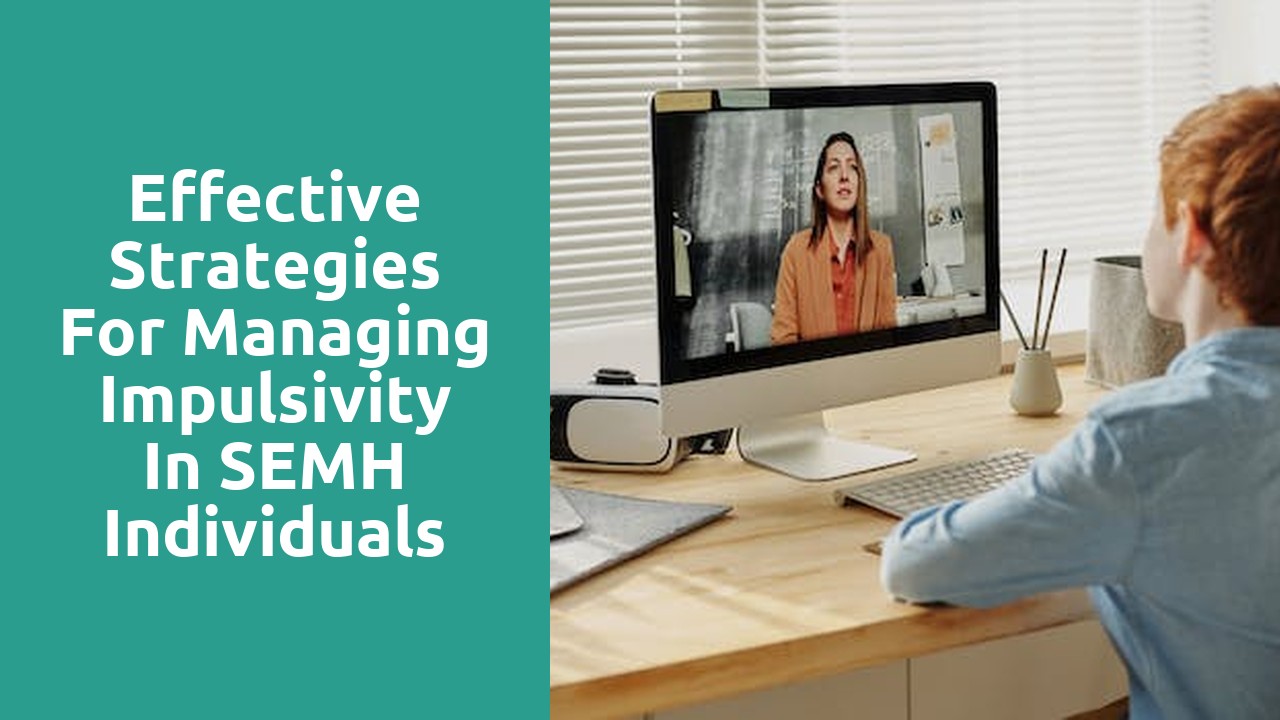

Impulsivity can pose significant challenges for individuals with Social, Emotional, and Mental Health (SEMH) conditions. These individuals often struggle with regulating their emotions and impulses, leading to impulsive behaviors that can have negative consequences for themselves and those around them. Impulsivity may manifest in a variety of ways, such as acting without considering the potential risks or consequences, difficulty controlling anger or frustration, or engaging in impulsive purchases or behaviors that interfere with daily functioning.
One of the primary challenges of impulsivity in SEMH individuals is the impact on relationships and social interactions. Impulsive actions can strain relationships with family members, friends, and even professionals working with these individuals. Unpredictable outbursts or impulsive decisions can create tension and misunderstanding, making it difficult for others to provide support and understanding. Additionally, impulsivity can lead to a cycle of regret and guilt, further impacting an individual's self-esteem and overall mental well-being. It is crucial to understand and address these challenges to support SEMH individuals in managing their impulsivity effectively.
Impulsivity is a common challenge faced by individuals with Social, Emotional, and Mental Health (SEMH) issues. Understanding the root causes of this impulsivity is crucial in order to effectively support and manage it. There are several factors that contribute to the development of impulsive behavior in SEMH individuals.
One possible root cause of impulsivity in SEMH individuals is an imbalance in brain chemistry. Research has shown that individuals with conditions such as Attention Deficit Hyperactivity Disorder (ADHD) or Oppositional Defiant Disorder (ODD) often have imbalances in neurotransmitters such as dopamine and serotonin, which are responsible for regulating mood and behavior. These imbalances can result in impulsive decision-making and poor impulse control. Additionally, traumatic experiences or chronic stress can also contribute to impulsivity in SEMH individuals. Adverse childhood experiences, such as abuse or neglect, can have a significant impact on the development of impulse control and emotional regulation skills.
Nurturing emotional regulation in individuals with Social, Emotional, and Mental Health (SEMH) challenges can be a complex endeavor, particularly when impulsivity is present. Impulsivity often manifests as difficulty in controlling emotions, leading to impulsive actions and reactions that can have negative consequences for both the individual and those around them. In order to effectively nurture emotional regulation in SEMH individuals with impulsivity, it is essential to create a supportive and understanding environment that focuses on developing the individual's self-awareness and coping skills.
One approach in nurturing emotional regulation is providing a safe and structured environment that encourages self-reflection and emotional exploration. This can be done through various strategies, such as incorporating mindfulness practices and teaching individuals to recognize and manage their emotions. By engaging in regular reflection exercises and discussing emotional experiences, individuals with impulsivity can gain a deeper understanding of their triggers and develop strategies to regulate their emotions effectively. Moreover, by emphasizing the importance of emotional regulation and providing a space for open communication, individuals are more likely to feel supported and validated, which can contribute to their overall growth and development.
Creating a supportive environment is crucial when it comes to managing impulsivity in individuals with Social, Emotional and Mental Health (SEMH) issues. This requires a sensitive and understanding approach from those around them, such as family members, teachers, and friends. Building a supportive environment involves providing consistent structure, clear boundaries, and predictable routines that can act as sources of stability for individuals who struggle with impulsivity.
It is important to minimize any potential triggers or distractions that may contribute to impulsive behavior. This can be achieved by creating a calm and organized physical space that allows individuals to focus on tasks without unnecessary external stimuli. Additionally, establishing clear rules and expectations, along with providing positive reinforcement and rewards for desired behavior, can help individuals with SEMH feel safe and supported in their environment. By fostering a supportive environment, we can empower individuals with SEMH to build self-regulation skills and make informed choices, ultimately allowing them to better manage their impulsivity.
Developing coping mechanisms for impulsivity in individuals with social, emotional, and mental health (SEMH) challenges is crucial for their overall well-being and success. Coping mechanisms can help individuals gain a sense of control over their impulsive behaviors and provide them with healthier alternatives to managing their emotions and impulses.
One effective coping mechanism is cognitive reappraisal, which involves consciously reframing one's thoughts and interpretations of a situation to reduce impulsive reactions. By challenging negative or impulsive thoughts and replacing them with more rational and balanced thinking, individuals can gain better control over their impulsive behaviors. Cognitive reappraisal also helps individuals develop a greater understanding of the consequences of their actions, enabling them to make more informed decisions and avoid impulsive reactions that may have negative outcomes.
Enhancing self-awareness is crucial in helping individuals with social, emotional, and mental health (SEMH) challenges manage impulsivity. By developing a deep understanding of their triggers, emotions, and thought patterns, individuals can gain better control over impulsive behaviors.
One effective strategy to enhance self-awareness is mindfulness practice. This involves focusing on the present moment without judgment. By intentionally grounding themselves in the here and now, individuals can become more attuned to their thoughts, emotions, and physical sensations. This heightened self-awareness allows them to recognize impulsive tendencies as they arise, giving them the opportunity to consciously choose a more thoughtful and deliberate response. Additionally, regular mindfulness practice can help individuals develop greater self-compassion, which is essential in managing impulsivity without engaging in negative self-talk or self-blame.